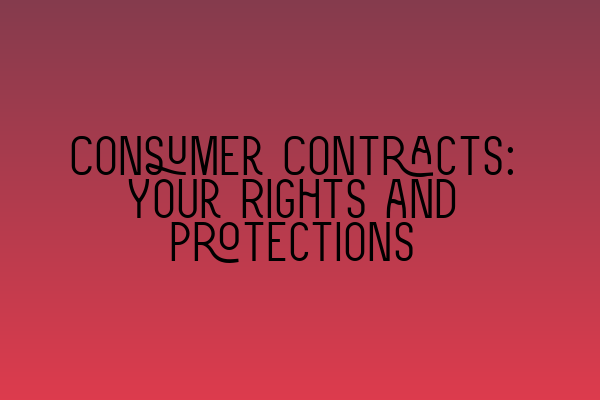Consumer Contracts: Your Rights and Protections
As a consumer, you have certain rights and protections when entering into contracts with businesses. These rights ensure that you are treated fairly and that your interests are safeguarded. Understanding these rights can help you make informed decisions and protect yourself from unfair practices. In this article, we will discuss the key aspects of consumer contracts and the rights and protections that you are entitled to.
1. Understanding Consumer Contracts
Consumer contracts are agreements between consumers and businesses for the purchase of goods or services. These contracts can be written or verbal, and they outline the terms and conditions of the transaction. It is crucial to read and understand the contract before signing or agreeing to it to ensure that you are aware of your rights, obligations, and any potential risks.
2. The Right to Clear and Accurate Information
One of the essential rights in consumer contracts is the right to clear and accurate information. Businesses must provide clear and transparent information about the goods or services they are offering, including the price, delivery dates, cancellation policies, and any associated fees or charges. Misleading or deceptive information is against the law, and consumers have the right to take action if they have been misled.
3. The Right to Fair Contract Terms
Consumer contracts must contain fair terms that are balanced and reasonable. Unfair contract terms, such as those that excessively limit the consumer’s rights or unfairly shift the burden of responsibility onto the consumer, are not enforceable. If you come across any unfair terms in a contract, you have the right to challenge them and seek redress.
4. Cooling-Off Period
In some cases, consumers have the right to a cooling-off period, which allows them to change their minds and cancel the contract within a specific timeframe. The cooling-off period typically applies to contracts made away from business premises or through distance selling, such as online or over the phone. It provides consumers with an extra layer of protection and allows them to reconsider their purchase decision without penalty.
5. Remedies for Breach of Contract
If the goods or services provided to you do not meet the agreed-upon terms of the contract, you have the right to seek remedies for breach of contract. This can include requesting a repair, replacement, or refund. In some cases, you may also be entitled to compensation for any losses or damages suffered as a result of the breach.
6. Consumer Protection Laws
Consumer contracts are governed by various consumer protection laws, which vary from country to country. These laws aim to protect consumers from unfair or deceptive practices and provide legal recourse in case of disputes. Familiarize yourself with the consumer protection laws applicable in your jurisdiction to understand your rights and how to enforce them.
7. Seeking Legal Advice
If you encounter issues with a consumer contract, it is advisable to seek legal advice from a qualified solicitor who specializes in contract law. They can assess the details of your situation, provide guidance on your rights, and help you navigate the legal process if necessary.
Conclusion
Consumer contracts play a significant role in protecting the rights and interests of consumers. By understanding your rights and how to enforce them, you can ensure fair treatment and avoid falling victim to unfair practices. If you have any concerns or questions regarding a consumer contract, it is always best to consult with a solicitor who will provide you with professional legal advice tailored to your specific circumstances.
For more information about SQE exams and preparation, check out the following related articles:
– SQE 1 Practice Exam Questions
– SQE 1 Practice Mocks FLK1 FLK2
– SQE 2 Preparation Courses
– SQE 1 Preparation Courses
– SRA SQE Exam Dates
Understanding your rights and protections in consumer contracts is vital for ensuring fair and transparent transactions. Arm yourself with knowledge and seek legal advice when needed to assert your consumer rights effectively.
